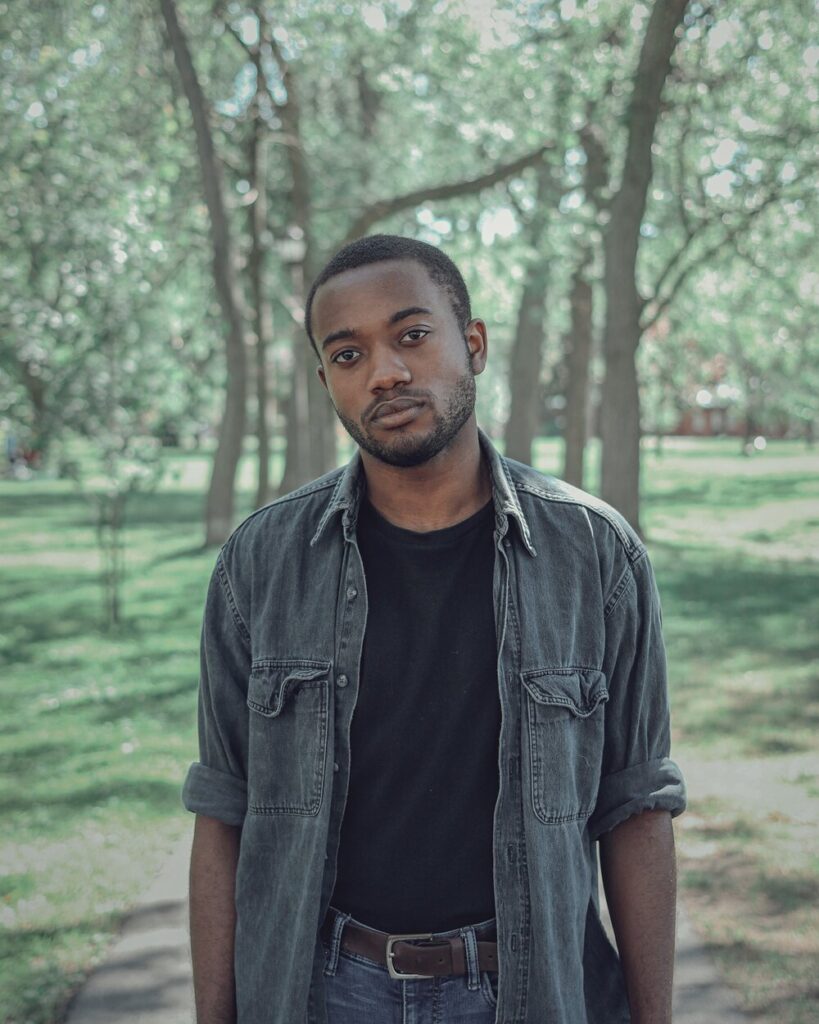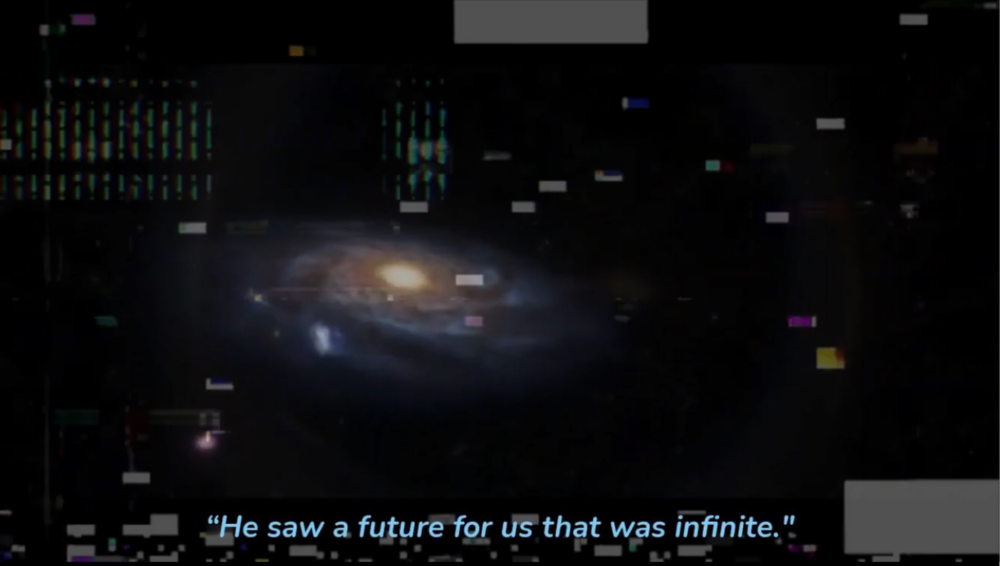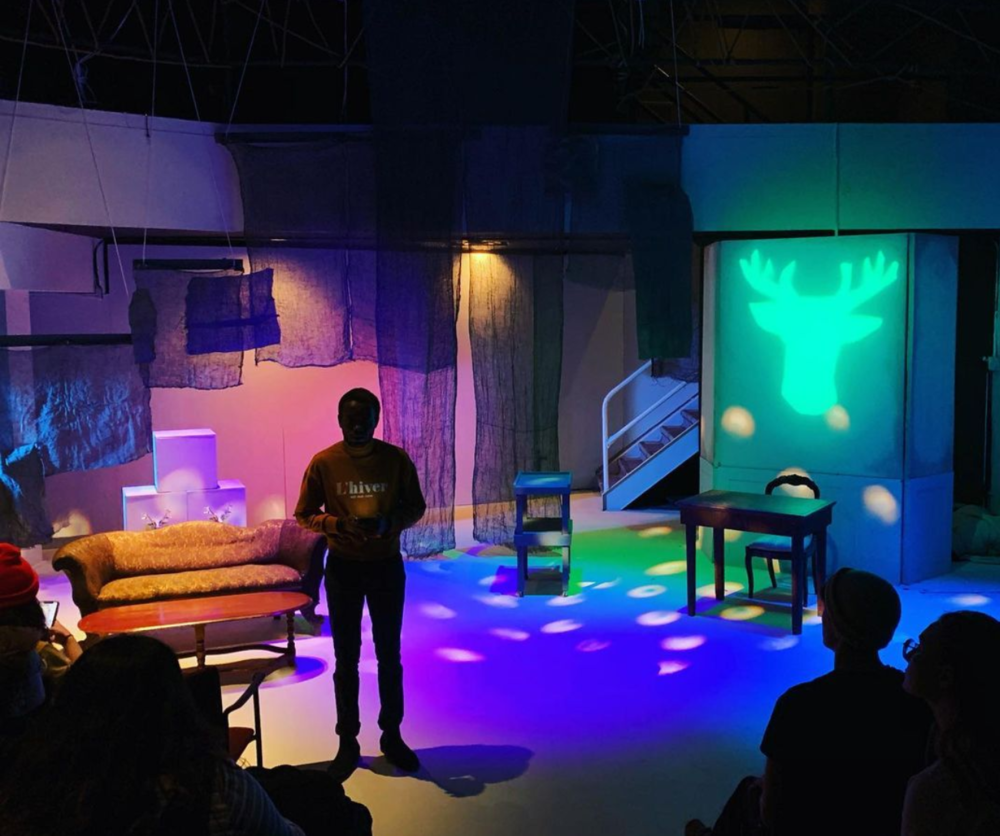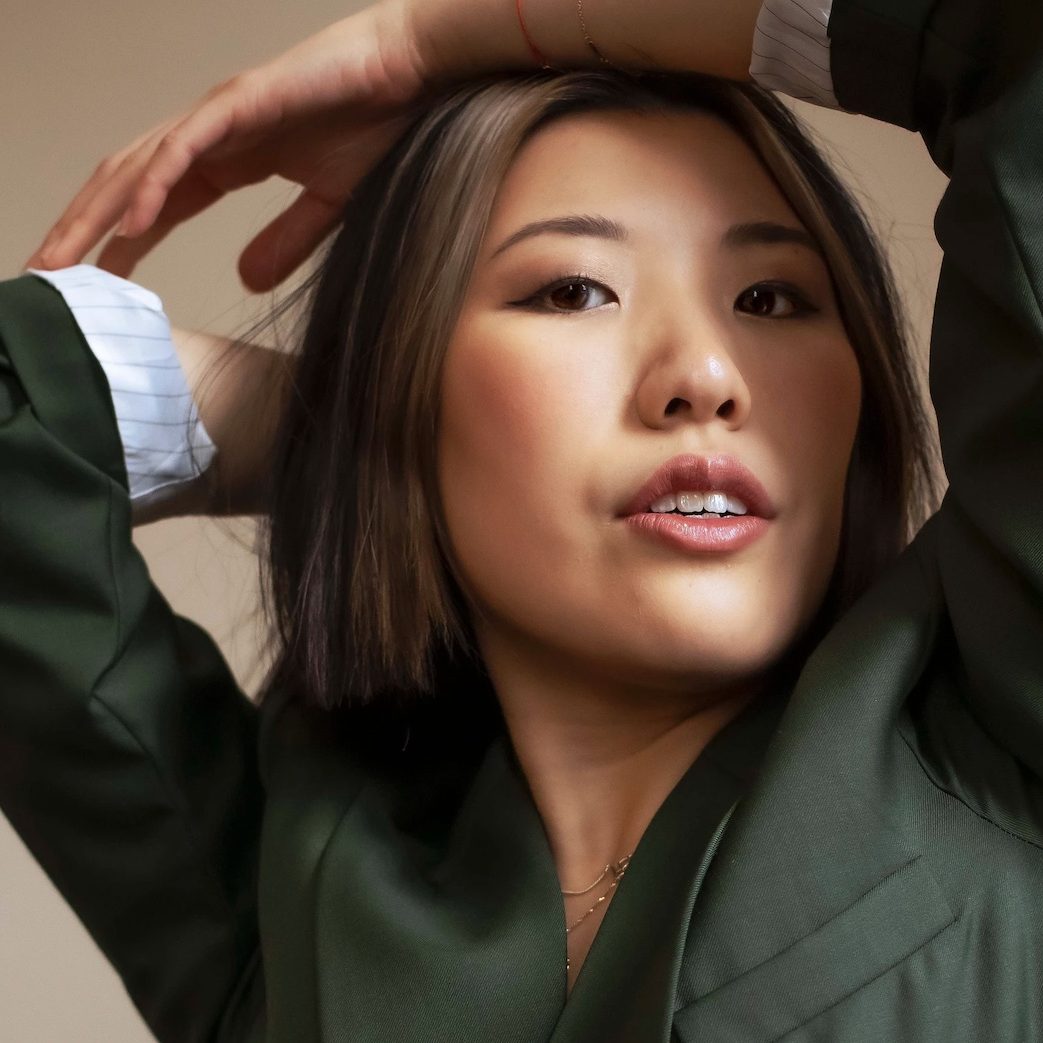21 Questions With Paul Smith

This interview contains explicit language and has been adapted for clarity and length.
If you’ve ever awkwardly stood by one of your friends as they catch up with someone you don’t know, you should keep reading. And if you don’t know Paul Smith, you definitely know someone who does.
Historically a performer, he recently created a spoken-word video project for Seeding the Future, a spin-off of Obsidian Theatre and CBC Arts latest anthology series 21 Black Futures. When we first met in 2017, I immediately demanded we become best friends. Today, he sits across my kitchen table agonizing over every word that comes out of his mouth (and the way it sounds). Not much has changed.
Except that the Scorpio has become an artistic staple to the city. All over town, local conversations about performance are permeated with his passion for storytelling. But Kingston has yet to hear his, and so:
1. What is the story of Paul Smith?
Face value, I am a person and friend. I am an artist (now a term I am trying to recognize within myself) from Stittsville, Ontario. I’m currently figuring out what kind of worlds I need to live in or make myself to make art, but I think I’m at an epilogue—it’s a series. I don’t know what book we’re on and how many there are all together, but currently it feels like whichever one we’re on right now, I’m at the epilogue.
2. What’s your relationship to Kingston and its people?
I owe Kingston a lot, it’s brought me to the place where I’m at now. In Stittsville, the things I did were more leadership based. It was Paul as a cadet, Paul as council president. I’m much closer to the Kingston community than I am with Stittsville. Kingston audiences are very engaged. There’s always someone in Kingston who’s picking up what you’re putting down. The way Kingston happens, everything is word of mouth. That connection is really there. But I’ve noticed that people are afraid to challenge Kingston audiences because of that relationship.
3. What has theatre within Kingston/Queen’s taught you about the possibilities of performance?
Theatre and performance is ingrained in everything. If you take a moment to stop and smell the roses, see the performativity around you in every space! If my housemate is telling me about something that happened that day, I’m seeing the mechanics of how he’s telling this story. It’s dope to see the things I’m studying have merit in the daily conversations I’m having. Theatre isn’t walking into a space and seeing a show. It’s not just actors onstage. It doesn’t need a script. It doesn’t need to be linear. You can tell a story without a “story” if that makes sense.
4. What draws you to storytelling? How has that evolved over the years, or is informed right now?
No matter what story it is, the art/practice creates a world in which you’re never wrong. Both for the person telling the story and receiving it, there’s no wrong way to tell or receive a story.
5. Is there a personal idea/understanding you’ve carried through your art this year?
The importance of the ‘We’ and the ‘Me’. The ‘we’ cannot exist without the ‘me’ and I always sacrifice the ‘me’ for the ‘we’. I realized that the work I’m doing cannot function if I’m not in a state to function. That looks like transparency and giving yourself time and space to focus on the ‘me’. At least that’s what my therapist said. But if I make space to allow myself to do that, I’ll in turn make space where others feel like they can too. Give yourself time and space to do the healing rather than just doing the healing as a first step.
I’ve also been on a big Sankofa kick. Sankofa is a teaching from the Akan people of Ghana and it means “go back and get it”. It pretty much boils down to learning from the past in order to move forward for the future.
6. What are you currently working on?
I’m currently trying to learn how to whistle.
You don’t know how to whistle? I can’t whistle. At all.
Paul tries to whistle. I blow air. We proceed for about a minute before—
I’m currently trying to figure out where theatre lives in the digital age. That’s not something I need to take on myself, I’m not trying to Atlas it. Something that is interesting me is where theatre and film intersect, and something like 21 Black Futures is what’s making me ask that question. 21 monodramas all done on a stage, but filmed.
7. What is 21 Black Futures and what did you do for it?
21 Black Futures is a series of 10 min. monodramas all created by 63 different black artists—21 playwrights, 21 directors, 21 actors—answering the question, “What is the future of Blackness?” This is the concept of future specifically with and for black voices. And if we’re asking questions about what the future of blackness is, why not actually talk to those who are? So they hired 21 theatre students to respond to the one of the pieces.

8. How do you think your piece responds to the original?
I was assigned 40 Parsecs and Some Fuel written by Omari Newton, directed by Lucius Dechausay, performed by Daniel Faraldo. 30 years from now, an engineer at Canada’s top space agency named Satchel Dew has given his absolute best of his abilities to this organization but he’s come to realize that he’s only getting paid to do this work to improve a white society. As a result, he reclaims control by taking back the ship he has built and leaves to create a future where black people can succeed. Why fix their world when we can make our own?
In America, there’s a saying ’40 acres and a mule’. When slavery was abolished, it was put into law that people would be promised 40 acres of land that wasn’t theirs to give away to begin with. And eventually a mule so they could till that land—it was like their stimulus check. Now a football field is a little bit less than an acre. It was a complete bullshit lie that every freed slave was told that they would be able to do 40 half-time performances! So what Satchel is saying is a play on that, 40 parsecs and some fuel is what he feels he’s owed.
I took ‘response’ quite literally. I imagine a world where he’s successful, but I chose not to go because I didn’t think Satchel fully thought through the consequences of his plan. Did he think about the world he was leaving behind, and what was going to happen for those who chose to stay? For me, the future of Blackness is a future that’s infinite.
9. What do you think would be missing if you did your response differently?
The same exit mentality Satchel has is the same mentality white folks had when they colonized North America. What’s stopping us from repeating history? Perhaps that didn’t get its due diligence. I decided quite early that writing and creating stories for myself wasn’t what I wanted to do, nor what I was good at. What made it easier was literally putting myself in the piece. Not including myself as a visual was a good call. I love a phone call/voicemail trope. It justifies why only one person is speaking and why it’s not meant for a big audience. No one else should be hearing this conversation.
10. How do you know you’re ‘Black’?
It’s kind of like the first time I found out I was Black: I only know I’m Black because of what other people tell me. Blackness now feels like reclaiming the process of othering.
11. Of the 21 Black Futures presented, which one do you connect the most with?
I don’t know if there is one. There’s an element in each performance that relates to every Black person watching. It almost feels like 21 different stages that Black folk go through, whether we have or have not yet experienced. In Georgeena, Virgilia Griffith is sitting in a car, in a wedding dress, heavy breathing—immediately you’re like, “Runaway bride.” Why else would she be here? And if she couldn’t do it, but why not? She’s explaining to the audience member in the car, but really, she’s talking to herself. There’s moments where she’ll look at the side mirror and she’s talking to you. We are that side mirror. She looks up at her rear view mirror and you are the rear view mirror. After dealing with microaggression after microaggression from her partner’s friends and family, kind of like a Meghan Markle situation if Prince Harry wasn’t supportive.
Imagine Meghan Markle was a runaway bride? The content.
Queen Elizabeth would be here for the drama. Brexit would be reversed.
I’ve never been a runaway bride and I won’t spoil the ending, but I’ve definitely sat in relationships where I’ve had to take microaggression after microaggression. Any person of colour in a white-dominated school system has had the exact moment Georgeena is going through. The slow burn and the break.
12. What about this experience do you think is distinct from other artistic opportunities you’ve been involved in before?
I thought Black people in the arts were a myth. I didn’t think it was possible to get 84 Black people in a room together. I really did not think the number was there. I have never gotten the opportunity to see 84 different Black voices in a room together. It’s the first time my Blackness and my identity has not been the thing in the room to create tension. It was the thing in the room to ease it.
13. How has your experience as an artist informed your understanding of your Black experience?
The experiences I’ve had in relation to my Blackness have previously taught me that my identities have a time and place. A director once said to me, “It doesn’t matter what role you play, you’re Black when you’re playing them. And that’s a fact because that’s also what people are going to see. So the time and place for your Blackness is all the time, not just in this specific moment when they need it.” Then I was in a show centered around Blackness, but it was asked for in a specific moment and based on the condition of exchange and labour. And we don’t want to touch it again after.
14. Where do you think 21BF enters in this time and space?
I think it makes its own. The project was birthed from this realization of how the time and space we’re working in is not working for what we want or need to do right now. So then how do we create a new world? For a project like this to be made, and the bodies within the project to be welcomed into it? I think 21BF created its own environment separate from the current theatre scene in the way that it took the familiar notions of theatre and brought it into an environment we’re not, and lives at that intersection.
I think people would argue that theatre and film are similar, but that’s just because they’re viewing both as entertainment and not the tools they offer.
The main thing about theatre is that some form of instantaneous conversation between the performer and the audience usually happens live. With 21BF, it’s not necessarily live but they’ve added elements of that conversation by using direct address. By using conventions of communication from theatre that aren’t necessarily in film because of that removal between the maker and the spectator. The camera lends itself to be the vehicle in which that conversation can happen.

15. What opportunities would you want to see in Kingston for yourself?
More places where I can fail. There’s both a fear and inaccessible nature to failing in this environment. You’re not done if you fail, but the stakes shouldn’t be as high. There’s something about making theatre with non-theatre people that I really enjoy. I want the opportunity to create more opportunities. I feel like I’m still at a point where I have to ask for space and ask for platforms. I want to be able to enact that. I know there are people who want to create but they don’t see them here.
16. From your experience, what do you see happening in the Kingston theatre scene and where would you like it to go?
I want it to go forward, and the only way that’s going to happen is if the audience is challenged. They’re being served the same ingredients in a variety of meals, which is cool because it makes you feel like you’re eating different things. If you’re staying healthy, that’s great! But what if you put something else in your body?
17. Three pieces of art someone in Kingston should consume based on your personal preferences? Be selfish.
A show would be We Are Who We are on Crave, music would be Blonde by Frank Ocean, and a play would be This Is How We Got Here by Keith Barker.
18. How has your perspective on ‘performance’ changed in the last year?
I may be quoting you when I say this, but this work that we’re doing is meant to be collaborative. It can’t be so rigid/regimented. As a director, everyone felt like I had to have all the answers. You need to know what you’re doing because that’s what your role is. People feel like they can’t say anything because it’s “not their place”. No! The whole thing we’re doing is collaborative. That doesn’t mean you do your thing and we bring it together. We’re all working on all of the things, you just happen to be the one actually doing those things.
19. What are you still confused about?
There’s a lot of gatekeeping in storytelling right now. Who has the right to tell what kind of stories has been really tripping me up. I wonder when we’re going to approach any play in the way we approach Shakespeare. That’s the day I’m waiting for, when the play itself is just a blueprint.
20. How can you become a better artist? Is there anything stopping you?
After last summer, I was angry at my environment and I was frustrated at the world yelling, “Why is what I’m thinking so distant from the space I’m in? Do I have to find a new space? Do I have to fix this one? Do I have to make a new one for myself?” I don’t trust myself. I need to. If a situation isn’t good for me, I won’t recognize that’s an issue and leave. I won’t go in on my instincts and I should.
I need to stop being angry. Or allow myself to be angry. That’s it actually. I need to stop being angry and frustrated at myself. I don’t give myself the time and space to feel emotions if they’re negative. Usually a space like theatre is where I use those things I’ve let fester. But when they don’t get that time and space, they feel so much heavier and force me to move slower.
21. If you could say anything to Kingston theatre-makers or goers, new or old, what would you say?
Take a chance and don’t be afraid to be wrong.
Paul currently resides in Kingston and is still learning how to whistle. His response EXODUS_VII was apart of a larger project called Seeding the Future, a spin-off of Obsidian Theatre and CBC Arts latest anthology series 21 Black Futures.
